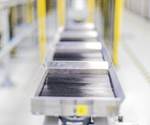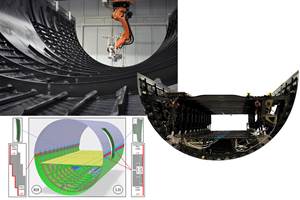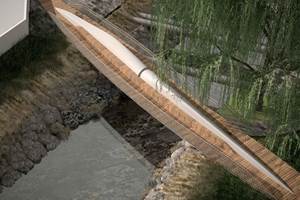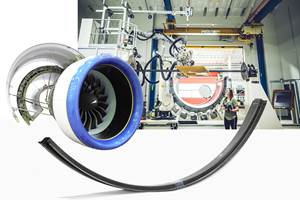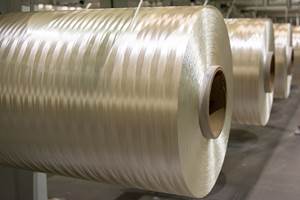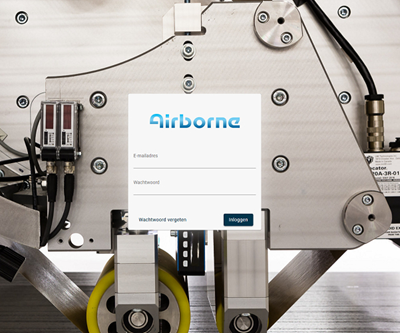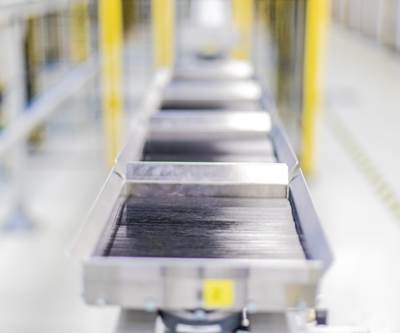Severstal invests in Airborne automated composites manufacturing
Airborne will work with steel company Severstal to explore integration of metal and composites.
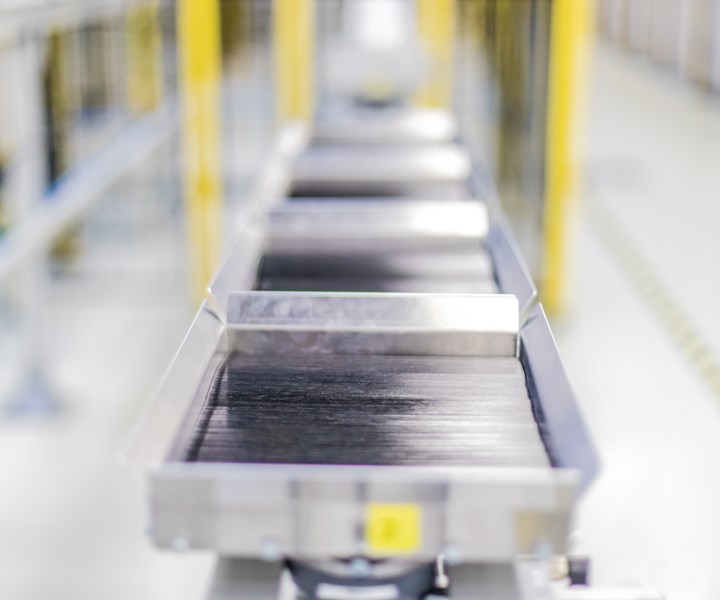
CW covered Airborne and SABIC’s high-speed system for producing consolidated laminates from thermoplastic composite tapes, called the Digital Composites Manufacturing Line, in August 2019. Image source | SABIC
Integrated steel and mining company PAO Severstal (Moscow, Russia) announced on Jan. 21 that it has invested in digital automation platforms specialist Airborne (The Hague, Netherlands), and that as part of this collaboration, Airborne will work with Severstal’s technical development and quality department to examine the potential of integrated solutions based on composites and steel. Severstal will offer its clients the opportunity to test these integrated solutions.
Airborne has developed and brought to market a set of digital technologies that increase the efficiency of carbon fiber composite production by automating the production process. The company is in the process of commercializing the automated production cells and software. At its facilities in the Netherlands and the U.K., Airborne manufactures composite products for a range of sectors including the automotive, construction, shipbuilding, aerospace, electronics and wind power industries.
According to Severstal, using automation cell technology can help reduce the cost of producing composite products and their development cycle while ensuring consistent quality at a high production speed.
“We are convinced that, going forward, the greatest demand from key industries will be for a ‘multi-material offer’ of composites containing a combination of materials, including steel.”
Severstal joins other investors in this investment round, including advanced materials venture capital fund Pangaea Ventures (Vancouver, Canada) and chemical company SABIC (Riyadh, Saudi Arabia).
“With our investment in Airborne, we are continuing to move towards our goal of achieving integration between metals and composites in the innovative solutions we offer our clients,” says George Gogolev, head of Severstal Ventures. “We believe this technology could transform the composites market in the next five to seven years by significantly reducing the price of end products. This will impact the metal market by enabling us to offer our customers new materials with unique properties that are not currently achievable in steelmaking. … [W]e are convinced that, going forward, the greatest demand from key industries will be for a ‘multi-material offer’ of composites containing a combination of materials, including steel.”
“… Together with Airborne, we plan to explore opportunities to move towards integrating metals and composites in our innovative customer solutions,” says Andrey Laptev, director of business development and corporate venture projects at Severstal. “With Airborne’s unique automation platform, customers will be able to place their orders directly on the appropriate portal, and receive an affordable product that meets their needs. On a global scale, we see huge potential for composite materials, the market value of which is estimated at $90 billion. Severstal is delighted to provide the team at Airborne with our support, and to be its first partner from the steel industry.”
“... We see that the global trend of lightweighting as a way to drive sustainability employs a great deal of multi-material solutions that combine the strength of metals and composites. While the steel industry is already very industrialized and efficient, the composite industry expresses a strong need to drastically reduce cost and improve efficiency, in order to accelerate the adoption of composites and enable its full potential. This can be done by automating the manufacturing process, as well as by digitalizing the full value chain to make design and manufacturing highly efficient, easy and flexible. We very much look forward to the collaboration,” says Arno van Mourik, CEO of Airborne.
Related Content
Manufacturing the MFFD thermoplastic composite fuselage
Demonstrator’s upper, lower shells and assembly prove materials and new processes for lighter, cheaper and more sustainable high-rate future aircraft.
Read MoreRecycling end-of-life composite parts: New methods, markets
From infrastructure solutions to consumer products, Polish recycler Anmet and Netherlands-based researchers are developing new methods for repurposing wind turbine blades and other composite parts.
Read MoreThe potential for thermoplastic composite nacelles
Collins Aerospace draws on global team, decades of experience to demonstrate large, curved AFP and welded structures for the next generation of aircraft.
Read MoreBio-based acrylonitrile for carbon fiber manufacture
The quest for a sustainable source of acrylonitrile for carbon fiber manufacture has made the leap from the lab to the market.
Read MoreRead Next
Airborne launches composite printing portal
The first application of the portal is for thermoset laminates manufactured in prepreg material by Airborne’s Automated Laminating Cell (ALC) technology.
Read MoreHigh-speed, high-rate thermoplastic composites manufacturing
A novel process from SABIC and Airborne promises high-speed, high-rate production of thermoplastic composite laminates for mainstream manufacturing and a variety of applications.
Read MoreDeveloping bonded composite repair for ships, offshore units
Bureau Veritas and industry partners issue guidelines and pave the way for certification via StrengthBond Offshore project.
Read More
.jpg;width=70;height=70;mode=crop)

